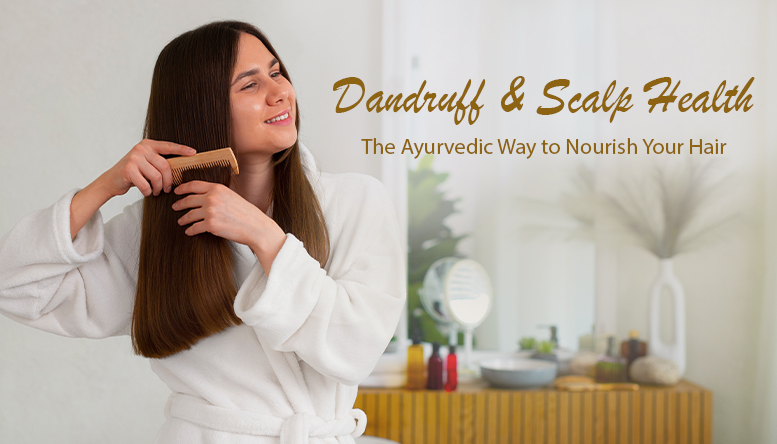
Sometimes, all we wish for is shiny and silky hair and a healthy scalp. But here comes the villain: dandruff! Those pesky flakes, accompanied by constant itching, are embarrassing and a sign of deeper hair and scalp problems. But don’t worry! In Ayurveda lies the worthy, time-tested, and lasting remedies that not only take care of the dandruff alone but also nurture the scalp to sustain it with vitality and radiance. Continue reading the blog ‘Dandruff and Scalp Health: The Ayurvedic Way to Nourish Your Hair’ to know more.
Dandruff occurs due to an imbalance in your scalp’s natural ecosystem. It could be due to overactive oil glands, dry skin, or even a fungal infection caused by Malassezia. Stress, diet, and environmental factors can also play a big role. A poor diet rich in processed foods, lack of hydration, or too much sugar can contribute to scalp dryness and oil buildup. Additionally, hormonal imbalances, certain medications, or seasonal changes (like cold, and dry weather) may also trigger or worsen dandruff. Other factors, like wearing tight hats or using harsh hair care products, may irritate the scalp, making dandruff worse.
Apart from visible flakes, you may notice itchiness, redness, or an irritated scalp. In severe cases, dandruff can lead to hair fall and a loss of confidence as well. Other symptoms may include:
Scalp Tightness: A dry feeling that leads to discomfort.
Excessive Oil: An oily scalp can encourage dandruff if left untreated.
Flaky Patches: These can range from small, white flakes to larger, thicker patches that are hard to remove.
Understanding these symptoms can help you determine the severity of your dandruff and take proper action.
Ayurveda views dandruff not just as a scalp condition but as a reflection of your body’s internal state.
In Ayurveda, an imbalance in the doshas - Vata, Pitta, and Kapha - is often the root cause of health issues, including dandruff.
Vata Imbalance: Leads to dryness and flaky dandruff.
Pitta Imbalance: Results in inflammation, redness, and an itchy scalp.
Kapha Imbalance: Causes oily dandruff and sticky flakes.
Having a rather good knowledge about your dosha type can guide you toward the right treatment.
The good news? Ayurveda offers a treasure trove of natural remedies that are not only effective but also nourish your hair and scalp holistically. Before going to the Ayurvedic hospital Dubai, just give these a try.
Oiling your scalp is an Ayurvedic staple and for a good reason.
Coconut Oil with Neem:
Neem’s antifungal properties, combined with the moisturizing benefits of coconut oil, help combat dandruff effectively.
How to Use: Warm the oil and apply it to your scalp and massage. Leave it overnight or for an hour at least and rinse with a mild shampoo.
Bhringraj Oil:
Known as the “King of Herbs” for hair care, Bhringraj soothes inflammation and strengthens hair roots.
Tea Tree Oil:
Though not traditional to Ayurveda, tea tree oil pairs well with Ayurvedic oils for fighting fungal infections.
Hair masks offer deep conditioning and detoxification for the scalp.
Fenugreek and Yogurt Mask:
Fenugreek (Methi) seeds are rich in anti-inflammatory properties, while yogurt provides a cooling effect.
Recipe: Soak fenugreek seeds overnight, make it a paste, and mix with yogurt. Apply and rinse after 30 minutes.
Aloe Vera and Neem Mask:
Aloe vera hydrates the scalp, and neem fights infection.
Recipe: Mix fresh aloe vera gel with neem powder and apply as a mask.
Ayurveda emphasizes that what you eat affects your skin and scalp
Foods to Include:
Fresh fruits and vegetables (especially leafy greens)
Whole grains like quinoa and brown rice
Healthy fats from nuts, seeds, and ghee
Foods to Avoid:
Oily, fried, and processed foods
Excess sugar and dairy products
Caffeine and alcohol
Staying hydrated is also crucial. Sip on herbal teas like tulsi or ginger for added benefits.
Shampoos often strip your scalp of its natural oils. Instead, opt for Ayurvedic cleansers.
Shikakai and Reetha:
These natural cleansers gently remove dirt and excess oil without disrupting your scalp’s pH balance.
Hibiscus Powder:
Known for its conditioning properties, hibiscus also prevents dandruff and promotes hair growth.
Stress is a sneaky culprit behind many hair woes, including dandruff. Ayurveda promotes practices that help to balance your mind and body.
Abhyanga (Self-Massage):
Regular scalp massages improve blood circulation and reduce stress.
Yoga and Pranayama:
Poses like the downward dog (Adho Mukha Svanasana) and breathing exercises like Anulom Vilom help detoxify the body and calm the mind.
Prevention is always better than cure. Here’s how you can maintain a healthy scalp long-term:
Establish a Weekly Routine:
Stick to a schedule of oiling, cleansing, and masking.
Choose Natural Products:
Avoid harsh shampoos and hair sprays that contain sulfates and parabens.
Protect Your Scalp:
Use a scarf or hat when exposed to the sun and pollution for long periods.
It’s easy to fall for quick fixes, but not everything you hear is true.
Myth: Washing your hair daily cures dandruff.
Fact: Overwashing can dry out your scalp, worsening the condition. It strips away the natural oils your scalp needs for balance, which can lead to more flaking and irritation.
Myth: Dandruff is contagious.
Fact: It’s caused by internal imbalances or fungal overgrowth, not by contact. You can’t catch dandruff from someone else.
Myth: Dandruff only occurs in people with oily hair.
Fact: While oily hair can contribute to dandruff, dry scalp, and skin conditions can also trigger flakiness. It’s about the imbalance in the scalp’s ecosystem, not just oil production.
Myth: Anti-dandruff shampoos will fix the problem permanently.
Fact: These shampoos provide temporary relief but don’t address the underlying causes. To truly get rid of dandruff, you need a holistic approach, including diet, lifestyle changes, and proper scalp care.